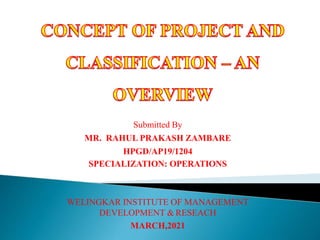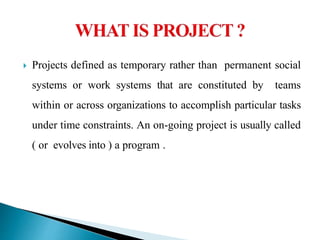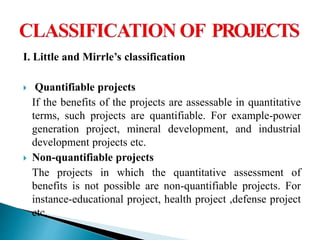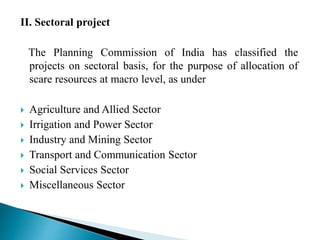Concept of project and classification ŌĆō an overview prentation
- 1. Submitted By MR. RAHUL PRAKASH ZAMBARE HPGD/AP19/1204 SPECIALIZATION: OPERATIONS WELINGKAR INSTITUTE OF MANAGEMENT DEVELOPMENT & RESEACH MARCH,2021
- 2. ’üĮ Projects defined as temporary rather than permanent social systems or work systems that are constituted by teams within or across organizations to accomplish particular tasks under time constraints. An on-going project is usually called ( or evolves into ) a program .
- 3. ’üĮ Projects have several characteristics ’üĮ Projects have a purpose ’üĮ Projects are realistic ’üĮ Projects are limited in time and space ’üĮ Projects are complex ’üĮ Projects are collective ’üĮ Projects are unique ’üĮ Projects are an adventure ’üĮ Projects can be assessed ’üĮ Projects are made up of stages
- 4. The objectives and goals of the organization can be achieved in an efficient manner through proper project management. Project manager plays a key role in managing the project. They forecast all the risks that might arise during the production process and ensure that all the risks are addressed with a proper plan. By following a good project management structure the employees will have a good understanding about their roles and responsibilities, they will also be aware of the schedule of the deliverables and will have the opportunity to plan their schedule accordingly. A good project management structure ensures that the project is completed within specified time period and within budget.
- 5. Project management is the application of processes, methods, skills, knowledge and experience to achieve specific project objectives according to the project acceptance criteria within agreed parameters. Project management has final deliverables that are constrained to a finite timescale and budget.
- 8. ’üĮ Initiation phase ’üĮ Definition phase ’üĮ Design phase ’üĮ Development phase ’üĮ Implementation phase ’üĮ Follow-up phase
- 9. I. Little and MirrleŌĆÖs classification ’üĮ Quantifiable projects If the benefits of the projects are assessable in quantitative terms, such projects are quantifiable. For example-power generation project, mineral development, and industrial development projects etc. ’üĮ Non-quantifiable projects The projects in which the quantitative assessment of benefits is not possible are non-quantifiable projects. For instance-educational project, health project ,defense project etc.
- 10. II. Sectoral project The Planning Commission of India has classified the projects on sectoral basis, for the purpose of allocation of scare resources at macro level, as under ’üĮ Agriculture and Allied Sector ’üĮ Irrigation and Power Sector ’üĮ Industry and Mining Sector ’üĮ Transport and Communication Sector ’üĮ Social Services Sector ’üĮ Miscellaneous Sector
- 11. III. Techno-economic projects ’ü▒ Factor-intensity oriented classification ’üĮ Capital-intensive projects ’üĮ Labour-intensive projects ’ü▒ Causation-oriented classification ’āś Demand based projects - If there is an increasing demand for certain goods or ’āś Raw materials based projects - If the availability of specific raw materials or ’āś Magnitude oriented classification - Under this category, the projects are
- 12. IV. Financial Institutions Classification ’ü▒ Profit-oriented projects ’üĮ New Projects ’üĮ Development / Expansion Projects ’üĮ Modernization / Technology Projects ’üĮ Diversification Projects ’ü▒ Service-oriented projects These include the following ’üĮ Welfare projects ’üĮ Service projects ’üĮ Research and Development projects ’üĮ Educational projects.
- 13. ’üĮ Space ’üĮ National Highway Development Programme ’üĮ Konkan Railway Project ’üĮ Delhi Metro Rail Corporation ’üĮ Bandra Worli Sea Link ’üĮ Super Critical Thermal Power Plants ’üĮ Telecom Networks Indian Software Capabilities ’üĮ Biotechnology ’üĮ Nationwide new Township Development ’üĮ Huge Retail Development
- 14. A project is an economic activity with well defined objectives and having specific beginning and end and Project management is all about creating an environment and conditions in which to achieve a particular goal or objective - in a controlled manner with a team of people. When you're familiar with what project management entails, from the process to mitigating all that can possibly (and often does) go wrong, you affect the end result - whether you're engaged in a project methodology for the first time or a seasoned pro.
- 15. ’üĮ Project Management Handbook Version 1.1 - July 2006 - Wouter Baars ’üĮ PROJECT MANAGEMENT - By Neha Tikoo ’üĮ Concept of Project - Project Management, Entrepreneurship & Small Businesses| Edu Rev Entrepreneurship & Small Businesses ’üĮ Project Management - Adrienne Watt ’üĮ The practical guide to project management - Christine Petersen, PMP
- 16. Thank you
















